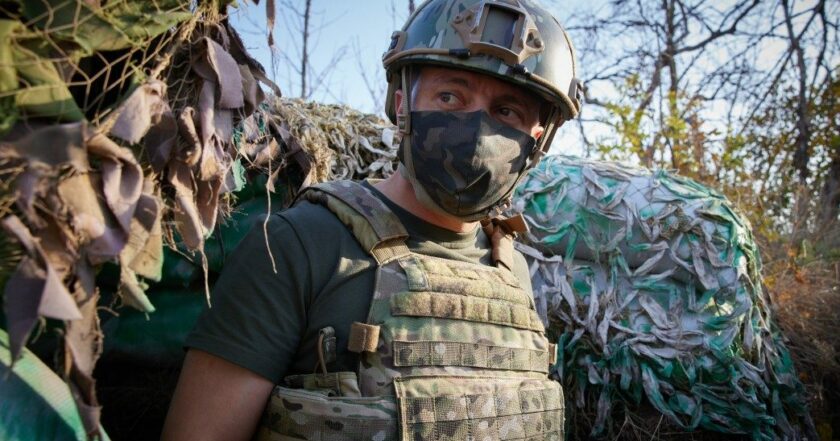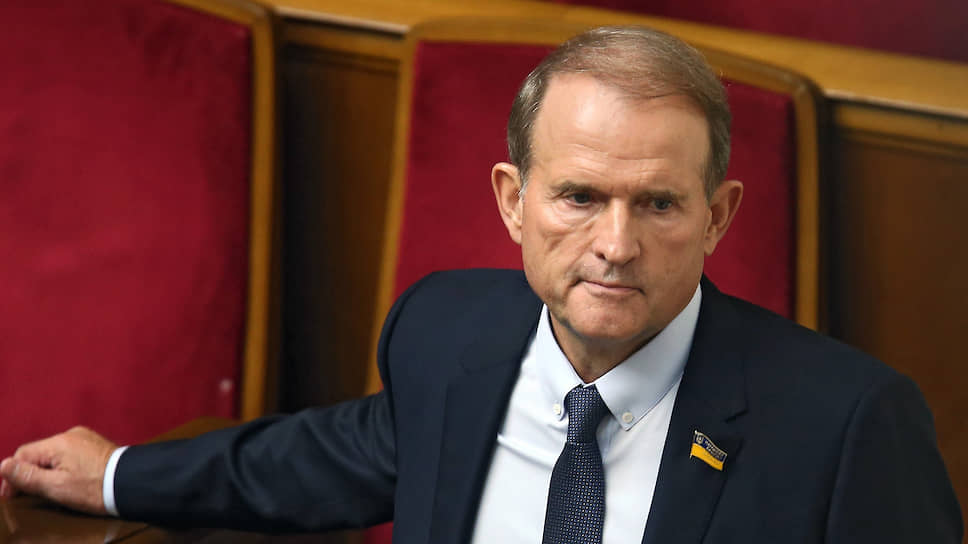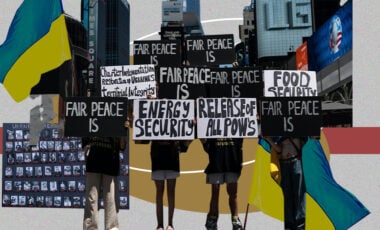Zelenskyi provoked the dragon. What's happening in Donbas
The long ceasefire in Donbas was named one of the 2020 major achievements for Volodymyr Zelenskyi and his team. Since there weren't so many victories, the president and his people tried to focus the attention of Ukrainians on this with all their might. And in some ways, they were right; for all six years of the war, it was the longest period when combat reports from the front smelled of boredom. But now this "golden age" has ended. What's happening at the front and what's the reason for the escalation, read in the new Rubryka article.

It's not just Medvedchuk
During February, Zelenskyi struck two powerful blows on the main friend of the Kremlin in Ukraine, Viktor Medvedchuk; first, the people's deputy was deprived of television channels, and soon after that, the financial empire associated with him was clamped down. It was immediately apparent that after this, statements from Russia alone wouldn't be enough; the President's Office knew this better than others.
On the eve of introducing the first wave of sanctions, the media practically ignored the fact of the sudden trip of the Commander-in-Chief of the Armed Forces of Ukraine Ruslan Khomchak to check the combat readiness of the troops, but after the NSDC decision was put into effect, it became clear that Zelenskyi prepared for trouble ahead of time.
But in reality, everything is more complicated: the situation began to heat up at the end of January. Soon after the New Year holidays, the OSCE began to record an increasing number of violations of the ceasefire by the "L/DNR": from several incidents a day to dozens or even hundreds of cases. It was followed, as expected, by the first wounded and then dead soldiers of the Armed Forces of Ukraine: 11 victims since the beginning of February.
"There's simply no truce anymore. We can no longer pretend it exists. We must tell the truth, call white, white, and black, black. Russians begin to act boldly, openly, not hiding their intentions," the first President of Ukraine, head of the delegation to TCG, Leonid Kravchuk, said.
Another probable reason is the inviability of the "L/DPR" existence in conventional peacetime. While hostilities are going on at the front, the occupation regimes can explain the meaning of their existence, the systematic destruction of industry, flooded mines, and other troubles that have befallen Donbas. Peacetime requires other tasks from the conventional "government": creation and development, with which the so-called administration is clearly unable to cope.
"The fact is that it was obvious that there'd be a response from Russia for Medvedchuk. If they really made such a decision, then Putin acted quite competently, waiting for a pause. If the escalation began from the very first days, it would play against him. So the pause has been sustained and the "DPR/LPR" militants declare that they have orders to intensify the shelling of Ukrainian positions. So, I think, it's one of Russia's responses. At the same time, it'll manifest itself in other spheres, where Russia still has leverage for pressure. Medvedchuk is a very personal channel for Putin, so he'll take revenge," a political scientist, director of the Dialogue Institute for Social and Political Design, Andrii Miseliuk, told Rubryka.
Should we expect a big war in Donbas?
The crucial question is to what extent the hostilities can flare up. The last serious escalation in Donbas was back in the days of Petro Poroshenko: then the militants staged powerful fire in three directions at once: Mariupol, Donetsk, and Luhansk. This was a response to the advance of the Ukrainian Armed Forces in the gray zone on the Svetlodarska arc.
At first glance, the enemy has no such reasons now. But it's still impossible to exclude the possibility of a serious escalation.
"There were two global escalations in Donbas: before the first 'Minsk' and the second one. Since then Russia hasn't resorted to such actions. Now we can say that it has no such preconditions. Meanwhile, we cannot rule out that this time, there will be an escalation of a higher level than it has been in recent years," expert Andrii Miseliuk explained to Rubryka.
"For me, the war didn't stop. The ceasefire that was announced in July and lasted almost six months… there was shelling, people died on each side. I have a question for our top military-political leadership: who'll be responsible for this catastrophe? Territories that are increasingly moving away from Ukraine have absolutely everything of their own: money, "government," anthem. They already look at us as an enemy state. There must be a very delicate work, for which the Supreme Commander-in-Chief is responsible," a military diplomat, ex-deputy head of the Main Intelligence Directorate, Major General of the Reserve Petro Harashchuk noted in an interview with Rubryka.
The season also speaks in favor of the escalation of hostilities: spring and early summer are the enemy's favorite periods when the number of shelling of positions of the Armed Forces of Ukraine grows. According to the speaker of the Ukrainian delegation in Minsk, Oleksii Arestovych, there's a real danger.
"I believe that an escalation isn't just possible, but practically inevitable. The Kremlin won't abandon its attempts to push us through by force. I don't undertake to name the exact date, although there are signs it may be this spring, closer to summer," he suggested.
The Minister of Internal Affairs Arsen Avakov adheres to the same opinion:
"The snow will melt, provocations will begin at the front, unfortunately, and we must be ready for this. The situation 'we're closed and we will do nothing, we'll wait until Putin's regime falls' won't happen; we'll need to stand up for ourselves," he said in a recent interview.
The enemy may not dare to engage in full-scale hostilities, but we should all prepare for the worst. Horlivka, Popasna, Yasinovata are the enemy's favorite places for provocation, where a sea of Ukrainian blood has been spilled over the past 7 years.
What's next for Zelenskyi?
Initially, Zelenskyi came to power under completely pacifist slogans, which the society took with a bang in contrast to the campaign of Petro Poroshenko under the slogan: "Army, Language, Faith."
And the first six months after Zelenskyi took office, it seemed that he would succeed: intensifying negotiations, exchanging prisoners, meeting with Vladimir Putin in Paris; all this looked fresh and inspired hope.
However, that meeting in the French capital in December 2019 was, in fact, the peak of the thaw in Russian-Ukrainian relations. By the end of the year, another large exchange of prisoners took place by inertia, Gazprom agreed to pay $3 billion to Ukraine, and after that, the negotiations froze.
At first, it was attributed to the impact of the coronavirus epidemic, which grabbed the attention of the leaders of both countries; then to temporary difficulties in the communication of individuals, but after a serious and fruitless shake-up of the composition of the Ukrainian delegation to the TCG, it became clear that the negotiations were again at a dead end. Russia doesn't want to make concessions on Minsk, and Ukraine cannot fulfill the agreements signed under pressure in 2014, since this would mean complete surrender.
Zelenskyi didn't forget the promise to switch to plan "B" for Donbas after a year of negotiations in Minsk; this time came back in December 2020, but then the President's Office tried to avoid specific answers about plans to resolve the conflict in eastern Ukraine. It seemed that they hadn't formed them yet. It's far from a given that it happened a few months later, but towards the end of the second year of his presidency, Zelenskyi began to act much more harshly. It seems that the time of illusions when the head of state wanted to "just look Putin in the eye" sank into oblivion. Perhaps it's for the best: Ukraine needs a realist president now more than ever.






















































